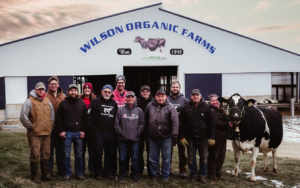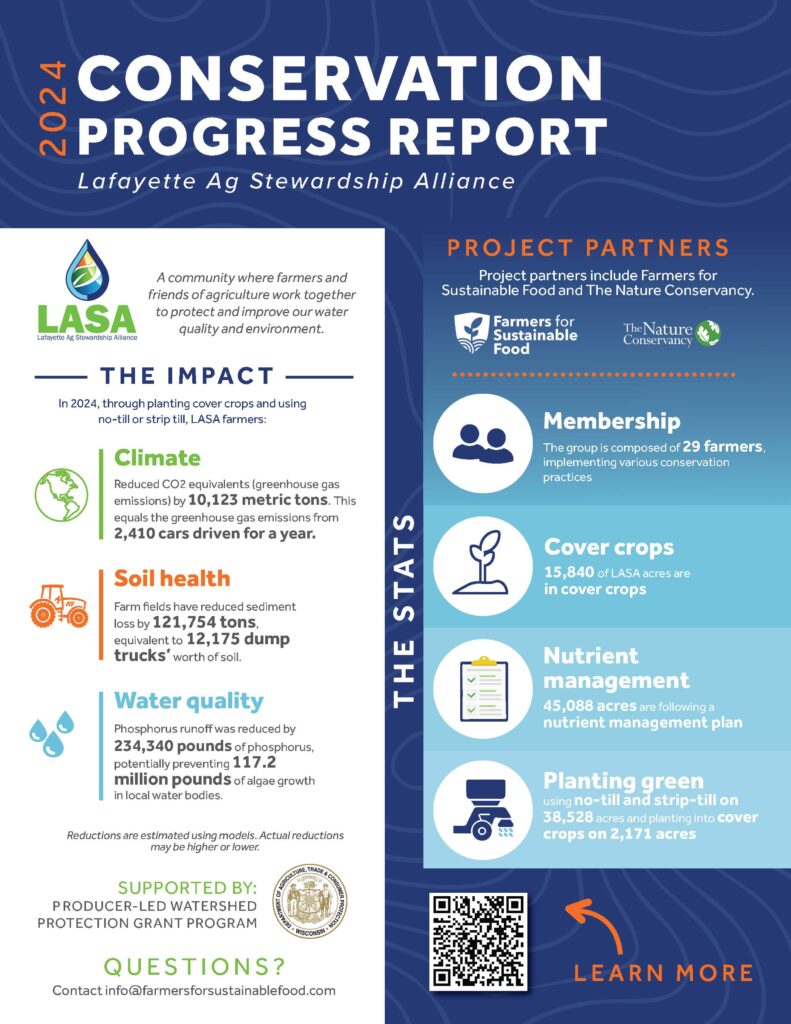2024 annual report demonstrates the group’s conservation progress
CUBA CITY, Wis. — Wilson Organic Farms in Lafayette County, Wis., has been operating since 1848. Today, the farm is managed by a group of Wilson family members, including Chris Wilson, a Lafayette Ag Stewardship Alliance member.

The farm was an early adopter of USDA-certified organic farming, making the transition in 1996. It operates based on a closed system, where nearly all feed and crop fertilizers (manure), are produced on the farm.
“Sustainability is at the heart of everything we do because we want to ensure that our land, water and ecological resources are healthy and highly productive for future generations,” Wilson said.
The Wilsons have adopted various progressive farming practices, such as organic no-till, cover cropping, diverse cropping rotations and adaptive managed grazing.
“Organic no-till farming and diverse crop rotations have helped us improve soil structure and soil biology while retaining moisture and reducing our soil erosion,” he said. “We’ve noticed that adaptive grazing on our pastures also promotes biodiversity and improves soil organic matter.”
Through LASA, Wilson is able to share his experiences with sustainable farming practices and connect with other farmers who are committed to conservation.
“Community is a value that our farm strongly believes in, and LASA is a community of neighbors and farmers who align in our dedication to environmental stewardship,” Wilson said. “Our goal is to help our region evolve and thrive, with healthy soils and good water quality.”
Annual survey results
As part of their membership, Wilson participated in the group’s 2024 annual Member Conservation Practice Survey, which tracks the collective conservation efforts among farmers in the group. Results demonstrate continued progress and potential environmental benefits to the region.
This is the seventh consecutive year the group has documented their sustainable practices, signifying their commitment to continuous improvement and enhancing the surrounding soil and water quality.
The group, comprised of 29 farmers, implemented various conservation practices including: planting 15,840 acres of cover crops, using no-till and strip-till on 38,528 acres and planting into cover crops (otherwise known as “planting green”) on 2,171 acres. They also measured nutrient management impact on 45,088 acres.
The potential environmental benefits of these practices:
- Reduction of greenhouse gas emissions by 10,123 metric tons of carbon dioxide equivalents, which is equal to greenhouse gas emissions produced by 2,410 cars driven in a year.
- Prevention of sediment loss from farm fields by 121,754 tons, equivalent to 12,175 dump trucks worth of soil.
- Reduction of phosphorus runoff by 234,340 pounds, potentially preventing 117.2 million pounds of algae growth in local water bodies.
Data was analyzed by Houston Engineering, Inc., and Farmers for Sustainable Food.
Farmers interested in finding out more about the programs LASA offers and how to become a member can visit their website at laffayetteagstewardship.org.
By the numbers
Number of acres covered by conservation practices among Lafayette Ag Stewardship Alliance members:
- 2018 ― 75,946
- 2019 ― 107,421
- 2020 ― 144,105
- 2021 ― 165,851
- 2022 ― 218,969
- 2023 ― 205,613
- 2024 ― 257,608
*Multiple conservation practices can be used on a farm field
Potential impact of conservation practices in 2024:
- Phosphorus runoff reduction ― 234,340 pounds
- Sediment erosion reduction ― 121,754 tons
- Carbon dioxide emission reduction ― 10,123 metric tons

About Lafayette Ag Stewardship Alliance:
Lafayette Ag Stewardship Alliance is a farmer-led non-profit organization with a vision of a community where farmers and friends of agriculture work together to protect and improve water quality and the environment. The group is based in Lafayette County in southwestern Wis. More information: www.lafayetteagstewardship.org.
